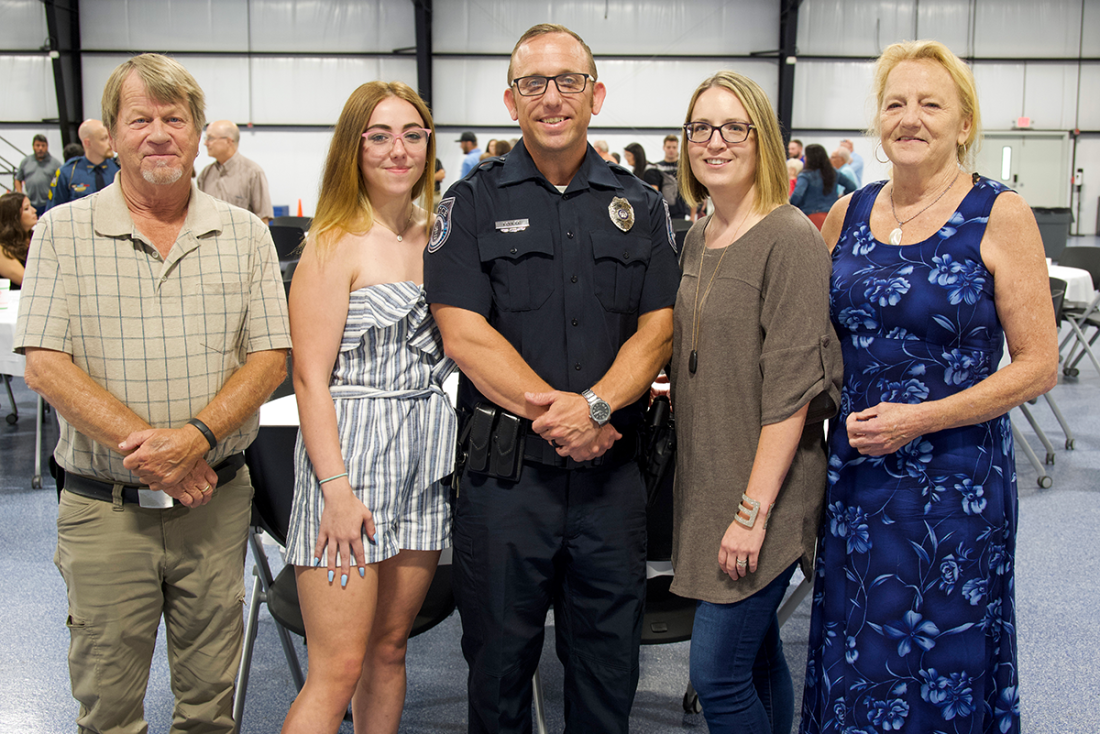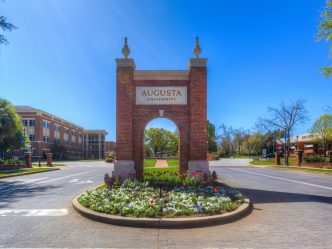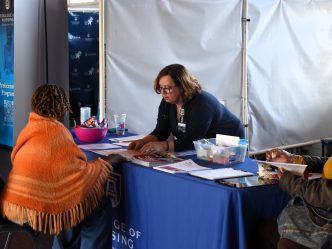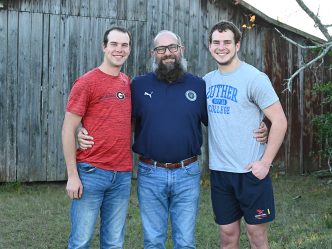David Pouler has made a career out of helping people — and he hasn’t let anything get in his way.
The fact that Pouler is missing the lower part of his left leg didn’t slow him down as a firefighter for 12 years, and certainly not as a county victim advocate for the last year and a half.
Not even the mud runs and obstacle course races he began participating in last year could slow the 39-year-old down. In fact, those helped him lose close to 100 pounds, which in turn has set him up for success during the rigors of training for the police academy.
He’s mastered his latest challenge by graduating from the Georgia Public Service Training Center’s Columbia County campus on June 24 to become the newest police officer for the Augusta University Police Department. The 12-week course included physical training, classroom education, weapons and tactical training, and education on how to handle different situations that might arise in law enforcement, and Pouler graduated with the highest GPA out of those in his class.
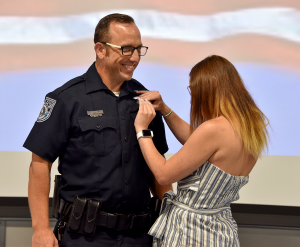
“What drew me to Augusta University and wanting to be a police officer here was my work over the last year and a half in victim advocacy and my time as a firefighter before that,” Pouler said. “I found being a victim advocate very rewarding, and I loved the job and getting to help people, but I still missed being on the front lines.
“I started looking around at different agencies and I just happened to see a posting for the position with AUPD, and I wanted to see what they were about,” Pouler continued.
“So, I did some research on their website and their Facebook page, looking at different things and what drew me to AUPD was the interactions I saw them having with the students, faculty and staff, and even the community. It looked like a lot of positive interaction, despite what you see in the news or the media about law enforcement and the community. I really liked that and I feel that’s what being a police officer is about: community involvement with those you’re serving, and that’s what I saw with AUPD’s website.”
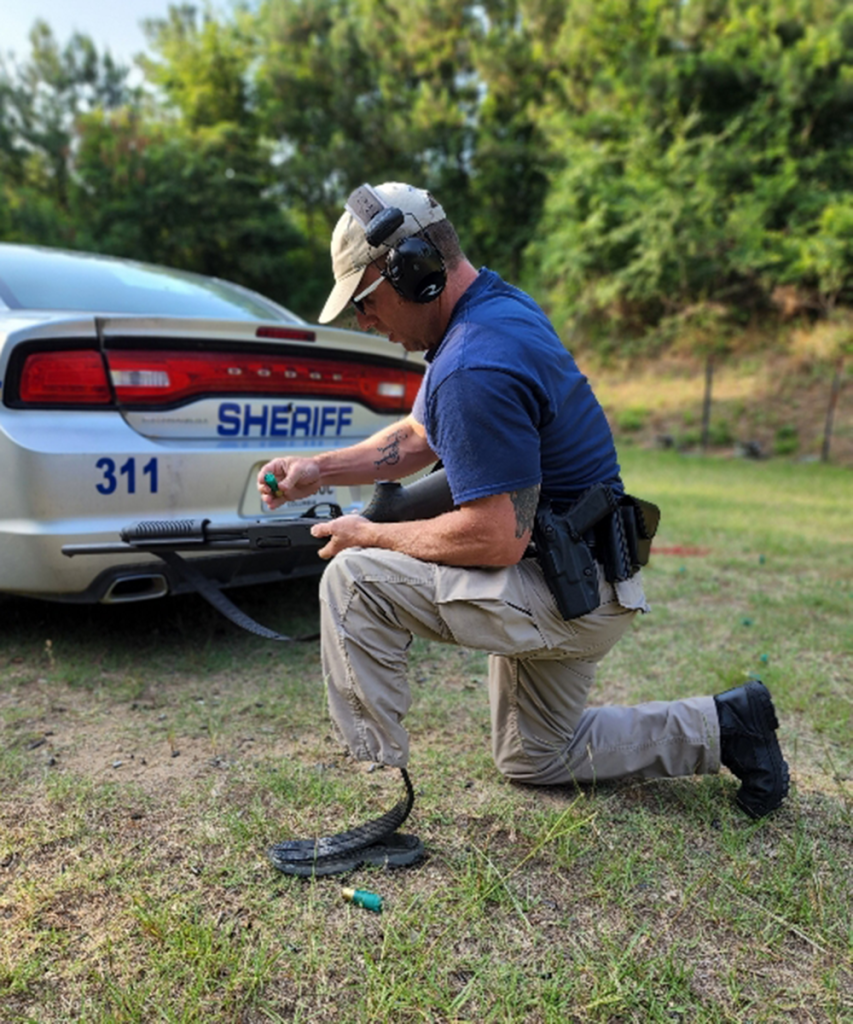
“David is an exceptional young man who has shown significant courage and determination to not only get through, but to excel in the police academy in an effort to ultimately serve his community. That should inspire all of us to do better,” said James Lyon, assistant vice president and chief of Augusta University public safety and police.
Captain Bryant Leverett echoed Lyon’s sentiments, saying “David demonstrates resilience, discipline, and dedication. David is the perfect model to each of us on how to face and overcome challenges. He has the right mindset and attitude to serve in the law enforcement profession.”
Lt. Waylon Potts has been heavily involved with Pouler’s onboarding, and through their interactions has come to believe Pouler will be a valuable asset to the team.
“From the time we met David he has always carried himself with professionalism and quiet confidence. David has shown that he wants to earn everything and will not accept anything being handed to him,” Potts said.
“He has more than earned my respect, and more importantly, he has earned the respect of all of those around him. David possesses leadership qualities that I am excited to see him utilize throughout his career. We always want to bring the best people into our profession and specifically into our agency, and we very much hit the mark on both accounts with David.”
The accident that changed his life
As a 13-year-old boy living in Grovetown, Pouler was like any other boy his age. Playing football was his first love, and he was beginning to experience the social anxieties that come with beginning your teens.
Then on April 26, 1996, Pouler had a completely different set of challenges added in.
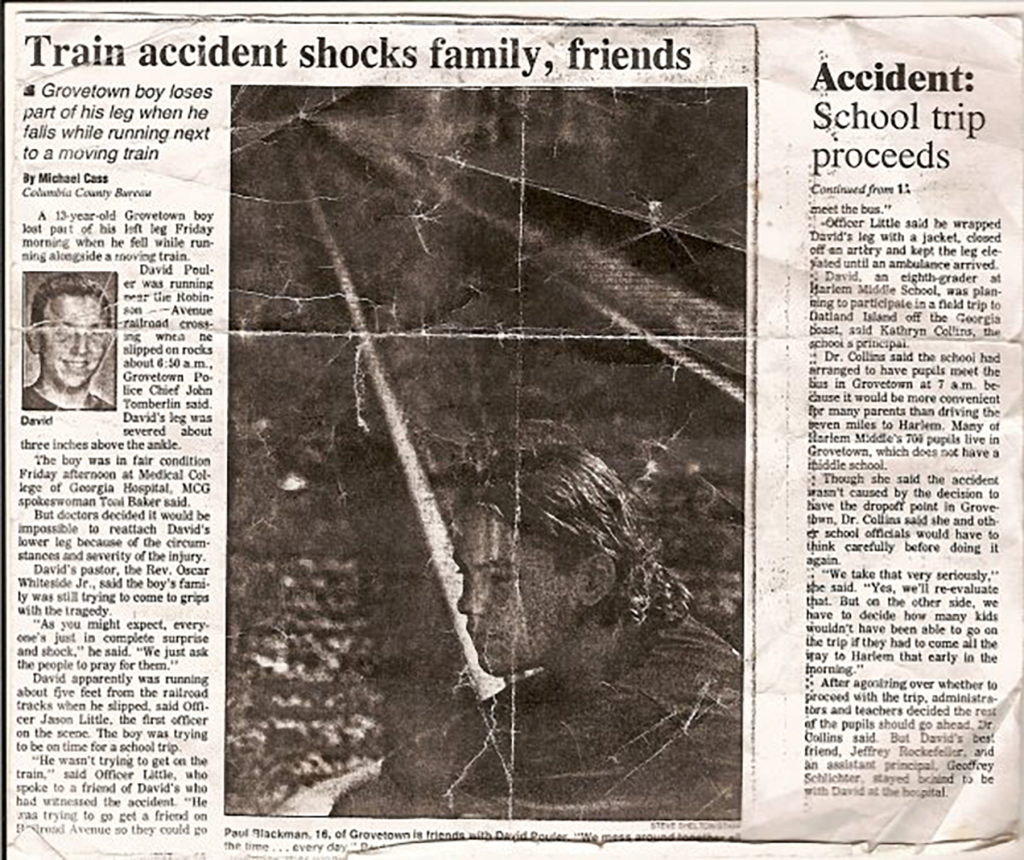
That morning, Pouler was running alongside a train near the Robinson Avenue railroad crossing in an attempt to arrive on time for a school field trip — but he slipped on some rocks shortly before 7 a.m., and his left leg was run over by the train. It was severed about three inches above the ankle.
Pouler was taken to the Medical College of Georgia where he and his family were told surgeons could not reattach the lower part of his leg due to the severity of the injury.
“I never thought I was going to die or anything like that,” Pouler said, looking back on the day that changed his life. “I don’t know if it’s because I was young and didn’t realize how serious it was, but my main concern was playing football. When the doctors said I would never be able to play football again, I was more disappointed in that because that was my first love growing up.”
But Pouler set out to prove the doctors wrong.
In what would be just a small glimpse into his will and determination, Pouler was able to take his first steps with the help of a prosthetic.
“As soon as I took my first steps in a prosthetic, I knew I was going to play football again,” Pouler said.
Pouler was able to try out for and play football just three and a half months after his accident, but the experience didn’t last for long: He needed more surgeries to repair his leg.
Despite the setback, he was eventually able to keep playing the sport he loved. “By my senior year I ended up starting at defensive tackle on my high school football team, and to this day that’s probably one of my proudest, most fulfilling moments as an amputee.”
Overcoming a different obstacle (course)
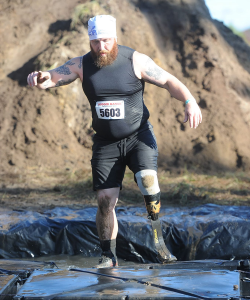
This time last year, Pouler estimated he weighed around 264 pounds. His brother in law Sgt. Drew Kovacs, a police officer with Athens-Clark County Police Department, had been posting pictures of mud runs and obstacle course races he was participating in, and Pouler found it exciting.
As he’s known to do, Pouler set his mind to giving it a try.
In the first six months after deciding to attempt a mud run, Pouler shed 40 pounds leading up to his first race.
His success in that first race encouraged him to do more, which has motivated him to continue his weight loss journey. He hopes to run more races later this year.
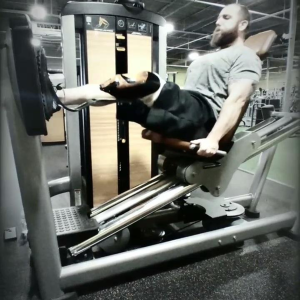
“This is pretty much the lightest I’ve weighed as an adult, and I love it,” Pouler said. “I was actually doing research on what the physical requirements are for becoming a police officer, and I decided to try to do some training that kind of revolved around that. So, I just kept going from there.”
Something that has made it easier for Pouler to be successful has been the service and equipment he has received from “the wonderful people,” as he describes them, at Augusta Orthotics and Prosthetics.
“They have helped me out so much, and I couldn’t have done what I’ve done up to this point without their help. They’re just great people,” Pouler said.
Not new to public service
While mud runs and being a police officer might be new to Pouler, a career in public service is not.
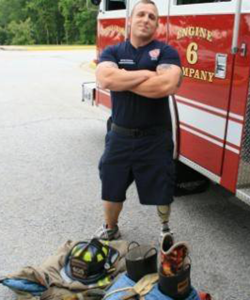
Aside from a short stint where he helped design and fabricate prosthetics, he remained with Columbia County until 2020 before taking a job in Aiken County as a victim advocate, where he worked until February of this year. With Aiken County, Pouler worked with victims from a variety of crimes, but mostly worked with those who faced domestic abuse.
During his time as a firefighter — a role in which your partner could rely on you to carry them out of a burning building — Pouler has had to reassure his teammates that despite being an amputee, he can still perform.
“One of the first things my first partner in the fire service for Grovetown said to me was, ‘I don’t feel comfortable fighting fires with you because of that,’ and he pointed at my leg,” Pouler said. “I told him that I couldn’t be mad at him because he didn’t know, but I said, ‘I’ll have to change that view then.’”
And a week later, Pouler had his chance to change his partner’s view with their first structure fire. Unsurprisingly, Pouler left a positive impact.
“He came up to me afterwards and said, ‘I take back everything I said. You rocked that call.’ That’s how I’ve been trying to be ever since,” said Pouler.
“People may not understand, so I just go, ‘Okay, I understand you feel that way, but let me show you why you’re wrong.’ I just do what I can to show them I can still do these things.”
 Augusta University
Augusta University
